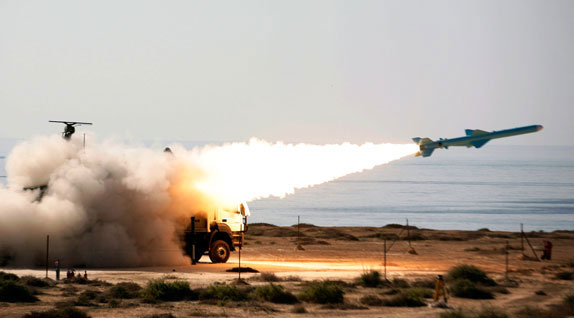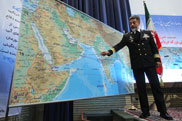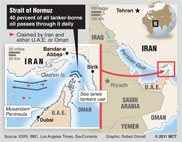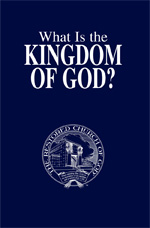 Ebrahim Noroozi/AFP/Getty Images
Ebrahim Noroozi/AFP/Getty Images
Article
Time to find a peaceful solution for tensions between Iran and Israel seems to be running out. The past foreshadows a future answer to this conflict.
Learn the why behind the headlines.
Subscribe to the Real Truth for FREE news and analysis.
Subscribe NowIt has been a war of words. Iranian President Mahmoud Ahmadinejad has often called for Israel to be “wiped off the map,” and Iran’s Supreme Leader Ayatollah Khamenei labeled the country a “cancerous tumor.” All the while, the nation insists its nuclear programs are for “peaceful purposes.”
In response, Israel has regularly warned the Western world of what a nuclear Iran means for the region. The nation’s prime minister, Benjamin Netanyahu, told The Atlantic, “Iran’s acquisition of nuclear weapons could spark a nuclear arms race in the Middle East. The Middle East is incendiary enough, but with a nuclear arms race it will become a tinderbox.” While Mr. Netanyahu feels economic sanctions against Iran may yet work, he cautioned that an element of “wide-eyed fanaticism” in Tehran makes it unpredictable.
Behind the barbed rhetoric, however, there are persistent rumors of action. A November 2011 report by the International Atomic Energy Agency (IAEA) stated that Iran’s atomic experiments are “specific to nuclear weapons.” In addition, a spate of alleged bombings and cyber-attacks at Iranian nuclear sites has led to speculation that these are covert actions by Israel (and potentially the United States). Whether either is true, Iran and Israel have characteristically denied the allegations.
 Hamed Jafarnejad/AFP/Getty Images
Hamed Jafarnejad/AFP/Getty ImagesWith each inflammatory comment and threat of military response, both sides become more committed to the exchange. Iran cannot back down or it risks no longer being taken seriously in the region. And Israel cannot relent, or it may be seen as a sign of weakness, prompting acts of aggression from other nations.
Notch by notch, the two sides escalate, and a positive outcome—for any involved—drifts further from view.
Dire Straits
With Tehran’s continual refusal to halt its nuke program, a military strike against the Middle East nation has increasingly become a serious option for both Jerusalem and Washington.
According to The New York Times, “Ehud Barak, the defense minister of Israel, said in late November that it was probably a question of nine months before Iran’s attempt to acquire nuclear weapons moved into a ‘zone of immunity’ where it could no longer be stopped.”
America takes a similar stance. The newspaper stated that Mr. Barak’s “counterpart in Washington, Leon E. Panetta, the secretary of defense, estimated that it was likely to be ‘about a year, perhaps a little less’ until Iran could have a nuclear weapon. Carefully imprecise, Mr. Panetta has said, ‘If we have to do it, we will deal with it’—without specifically explaining what ‘it’ is.”
For now, however, the West continues to apply pressure through economic means. The November 2011 IAEA report on Iran pushed European Union and Asia-Pacific officials to draw up plans for tougher sanctions against Iranian central and commercial banking institutions.
Threatening its multibillion dollar oil industry seemed to hit Iran where it hurts, sparking a flurry of military posturing. The Wall Street Journal quoted Iran’s Vice President Mohammad Reza Rahimi’s response to the news: “If they impose sanctions on Iran’s oil exports, then even one drop of oil cannot flow from the Strait of Hormuz.”
Such a move could seriously disrupt the world oil supply. According to the U.S. Energy Information Administration, “Hormuz is the world’s most important oil chokepoint due to its daily oil flow of almost 17 million barrels in 2011…almost 20 percent of oil traded worldwide.” The strait is 21 miles wide at its narrowest point.

Tehran, however, did not stop with verbal threats. Iran announced the effective test of its first nuclear rod—a significant leap in nuclear capabilities. In addition, the nation successfully test-fired anti-radar missiles during 10 days of naval exercises near the strait.
This warning had little effect on the West. The Wall Street Journal reported, “As a military matter, [a threat to close Hormuz] is mostly bluster. If it struck first, Iran could sink a few ships and do some damage. But Iran is no military match for the U.S. and its allies in the Persian Gulf. The Pentagon and the U.S. Navy’s Fifth Fleet both sent that message to Tehran…‘Any disruption,’ the Bahrain-based U.S. fleet said in an email, ‘will not be tolerated.’”
American President Barack Obama, who has said that no option is “off the table” to stop Tehran’s nuclear program, signed a bill containing sanctions against the nation’s central bank. Although the law will not go into effect for six months, BBC stated that news of the legislation caused Iranian national currency, the rial, to lose about 12 percent of its value—a record low.
The U.S. reads Iran’s threats to shut down the strait and its plummeting currency value as signs that sanctions are working.
Yet Iranian leaders believe the West does not have the stomach for a spike in the cost of oil, a likely byproduct of increased sanctions. CNN reported, “Iran notes that Western economies are under stress and predicts they could not afford higher oil prices. Even the threat of disruption in oil supply would send energy prices spiraling sky high, and that would plunge the already struggling economies of the United States and Europe into deeper recession. Iran is hoping to change the conversation in Western capitals from how tightly to squeeze Iran to what could be the cost of doing so.”
In addition, some analysts feel Iran is poised to weather tougher economic pressure. The Sydney Morning Herald said, “Given the Iranian regime’s current annual oil income of $US75 billion and trade diversification, more sanctions are unlikely to bring the regime to its knees. They can only make life more difficult for ordinary Iranians, just as was the case in Iraq under Saddam Hussein.”
 Spencer Platt/ (Left); Mario Tama/ (Right) Getty Images
Spencer Platt/ (Left); Mario Tama/ (Right) Getty ImagesDrums of War
Iran appears to have also prepared for an attack from Israel and the West. According to The Irish Times, the head of the Iranian Islamic Revolutionary Guard Force (IRGC) stated the nation’s nuclear facilities are now “invulnerable” to air strikes.
The newspaper stated, “The IRGC claims that in addition to deploying its nuclear programme to a series of deep underground bunkers, Iranian air defences have been strengthened to deal with any hostile air assault or pre-emptive missile strike.”
The Iranian Supreme National Security Council has determined that risk of a 2012 American/Israeli attack “is real and that the country’s forces need to prepare several contingencies for war,” according to The Washington Times. “It also was concluded that in case of war, the regime could be victorious, though the cost would be high, but it would emerge as the one and only champion of the Islamic cause in the world.”
Jerusalem and Washington are also readying for military conflict. Voice of America wrote, “Israel and the United States are planning joint military exercises…with a focus on missile defense.”
“In December [2011], Israel staged military exercises in the Golan [Heights]. It also held emergency drills on how to respond to attacks by missiles and biological weapons.”
Complicating matters, worries of nuclear proliferation do not stop with Iran. Other Middle East countries seem to have also caught the “nuclear bug.”
Leaked U.S. diplomatic cables revealed that Jordan and Bahrain officials “openly called for Iran’s nuclear programme to be stopped by any means, including military,” a 2010 Guardian article stated. The newspaper also reported, “Leaders in Saudi Arabia, the United Arab Emirates and Egypt referred to Iran as ‘evil’, an ‘existential threat’ and a power that ‘is going to take us to war’.”
To compete with other nuclear powers in the region, Saudi Arabia’s Prince Turki al-Faisal called on the Gulf Cooperation Council nations (Bahrain, Kuwait, Oman, Qatar, Saudi Arabia, and the United Arab Emirates) to develop “a powerful regional bloc with a unified armed force and a unified defense industry” (Arab News). He urged them to “at least study seriously all available options, including acquiring WMDs, so that our future generations will not blame us for neglecting any courses of action that will keep looming dangers away from us.”
In addition, UN investigators in Syria recently discovered a suspicious facility that strongly indicates it is pursuing nuclear weapons.
Vicious Cycle
At the core of the conflict sit Israel and Iran, and both must walk a fine line to avoid all-out war.
Israel wants to garner the Western world’s support before resorting to military action. But the nation can likely not ignore the threat of an Iranian attack for too long. Jewish history has taught the country that when someone says they want to “drive you into the sea,” you take it seriously.
The Economist called Israel’s anxiety over Iran “understandable.” “They fear a theocratic regime that embraces the Shia tradition of martyrdom may not be deterred by a nuclear balance of terror. For a country as small as Israel, even a small-scale nuclear attack could be an existential threat. Two of Netanyahu’s predecessors took action, against Iraq in 1981 and Syria in 2007, to prevent just such a threat; and it worked. The opportunity to attack Iran is now, before it is too late—or so the argument goes in many Israeli households.”
On the other hand, Iran desperately wants to be a regional leader, a status it would secure with proven nuclear-weapon capabilities. To most quickly achieve this, it must avoid an attack from the West.
The situation stands on a razor’s edge: each time Iran refuses to halt its uranium enrichment, Israel must more seriously consider the option of a preemptive attack. Internally, the Iranian regime can justify its nuke program as “self-defense” due to Israel being thought to have nuclear devices since the 1950s.
Pulitzer Prize-winning author Daniel Yergin summarized what the standoff means for the region in his book The Quest: Energy, Security, and the Remaking of the Modern World: “An Iran with nuclear weapons would change the balance of power in the Gulf. It would be in a position, to borrow a phrase that Franklin Roosevelt had used prior to World War II, to ‘overawe’ its neighbors. It could assert itself as the dominant regional power. Iran could directly threaten to use the weapons in the region—or actually use them—although the latter would likely trigger a massive and devastating response. But such weapons would also provide it with a license to project its power and influence with what it might regard as impunity throughout the region—both directly and through its proxies [such as the terrorist group Hezbollah].”
“The alarm among the other Gulf countries, as well as in Israel, about Iran’s objectives has been rising in direct proportion to Iran’s progress toward nuclear weapons capability. They fear that Iran will become more and more aggressive in seeking to assert its dominion over the region and in trying to destabilize other regimes. As one Saudi put it, ‘They want to dominate the region, and they express it strongly and clearly.’”
Historical Allies
Amid continuous brinkmanship and political posturing, one would think Israel and Iran have always been vehement enemies. Indeed, it is hard to imagine conditions that would allow Tehran and Jerusalem to enjoy favorable relations.
Yet, in utter contrast to today, Israelis and Iranians were consistent allies until 1979. The experience of a New York Times journalist provides an example of how different Iran is today: “As an American Jew visiting Iran, I apparently made an irresistible target. ‘Zionist Israel,’ an Iranian official instructed me, was the root of all problems in the Middle East; a Western ‘colonial imposition’ on Muslim lands that must be reversed. ‘It’s Iran’s own fault,’ I replied. ‘If Cyrus the Great hadn’t freed the Jews from Persian slavery 2,500 years ago and told them to return to Jerusalem and rebuild their Temple, there wouldn’t be an Israel.’ The official chuckled and changed the subject.”
The article continued, “Before Iran’s 1979 Islamic Revolution, ancient cultural bonds and common strategic interests between Persians and Jews made Iran and Israel close allies…If he knew his history, Ahmadinejad would recall that Iranian diplomats in Europe saved thousands of Jews from the Holocaust and that Iran served as an escape route for Iraqi Jews fleeing to Israel after the 1948 war for Israeli independence. In fact, Iran was one of the first Muslim countries to establish diplomatic and trade relations with the state of Israel. Common Sunni Arab enemies made Persians and Jews close friends for the next three decades.”
The example that shines above all others in regard to favorable relations between Iran (Persia) and Israel is the reign of King Cyrus over the Persian (or Achaemenid) Empire. Far from the typical ancient tyrant, historians regard him as a “man of peace,” and also a “strong and righteous ruler.”
Cyrus was able to bring together subjects of diverse cultures. According to Encyclopaedia Iranica, “The Achaemenids’ role in universal history lies in their fashioning a model for centralized rule over various peoples…to the advantage and profit of all and their achievement of a unified Iranian nation for the first time.”
In the book Ancient Persian Warfare, author Phyllis G. Jestice states, “Those he conquered, he treated well…so they would not think they had to fight to the death against him.”
The ruler is highly esteemed in Iranian culture. The Iran Chamber Society describes him as “upright, a great leader of men, generous and benevolent.”
King Cyrus even has a favorable report recorded in the Bible’s Old Testament: “Now in the first year of Cyrus king of Persia…he made a proclamation throughout all his kingdom, and put it also in writing, saying, Thus says Cyrus king of Persia, All the kingdoms of the earth has the Lord God of heaven given me; and He has charged me to build Him a house in Jerusalem, which is in Judah. Who is there among you of all His people? The Lord his God be with him, and let him go up” (II Chron. 36:22-23).
Under the rule of Cyrus, the Jews who were forcibly enslaved during the Babylonian Empire were allowed to return to Israel. Encyclopaedia Iranica stated, “In the Hebrew tradition embodied in 2 Chronicles 36:23 and Ezra 1:1-2 Cyrus is regarded with favor, and he has figured prominently in Jewish thought through the ages.”
Ancient Example
Cyrus the Great is one positive subject that most Iranians and Israelis can agree on. Persian descendants consider him an exceptional leader. And the Jews have him to thank for allowing them to return to Jerusalem—and helping to fund the building of the Second Temple.
Jewish historian Flavius Josephus wrote in the Antiquities of the Jews that Cyrus would “write to the rulers and governors that were in the neighborhood of their country of Judea, that they should contribute to them gold and silver for the building of the temple, and besides that, beasts for their sacrifices.”
Yet the historical record of King Cyrus does more than merely reveal an antiquated example of good Israeli-Iranian relations. It also typifies the only permanent solution for the Middle East.
The kingdom of Cyrus stretched from the western edge of modern-day India all the way to Turkey. He was “upright,” a “law-giver,” and a just ruler of the Persians, Assyrians, Jews and Babylonians.
Notice how the king was portrayed in the Old Testament book of Isaiah: “Thus says the Lord to His anointed, to Cyrus, whose right hand I have holden, to subdue nations before him…” (45:1).
Read the passage again. The God of the Bible calls Cyrus His “anointed.” The Hebrew term for this word is mashiyach. The other times this word is used, it refers to the Temple’s high priest or a king over Israel or Judea.
Beyond Cyrus, this term also applies to one additional Being: the Messiah. Thus, this ancient Persian king’s reign can be seen as a forerunner of the ultimate climactic fulfillment of the Messianic prophecy.
Notice the descriptions of Cyrus throughout the Old Testament:
- The king was named God’s “shepherd” (Isa. 44:28).
- He was charged to build a house for God (II Chron. 36:23).
- “All the kingdoms of the earth” were given to him (vs. 23).
Despite these physical parallels to the returning Jesus Christ—who is also known as a Shepherd (I Pet. 5:4)—a Builder (Heb. 11:10)—and King over all nations (Rev. 19:16)—the importance of what King Cyrus’ reign signified is hidden from almost all of mankind.
Lasting Peace
In his booklet What Is the Kingdom of God? David C. Pack describes the future fulfillment of what Cyrus’ kingdom and government exemplified in part: “Like a newscaster far ahead of his time, Christ came to make an announcement about a complete change in the way the world would one day be governed. With this change would come unprecedented world peace, happiness, harmony, universal health and prosperity.
“Everywhere He went, Christ spoke about the kingdom of God. It was the subject of most of His parables. When He commissioned His twelve apostles and sent them to preach, the instruction was to preach about the kingdom of God (Luke 9:1-2). When He later sent out His seventy disciples (Luke 10:1), He also commanded them to preach the kingdom of God (vs. 9). Paul preached this same ‘kingdom of God’ message everywhere he went (Acts 19:8; 20:25; 28:23, 31). The terms kingdom and kingdom of God are found scores of times throughout the New Testament. Yet, it is absolutely astonishing how nearly everyone has lost the knowledge and true meaning of what this kingdom is!”
The definitions of the English words “gospel” and “kingdom,” however, clearly explain what Christ meant. “Gospel” simply means “good news”—and “kingdom” is a form of “government.”
Mr. Pack continues, “In other words, Christ preached ‘the good news of the government of God.’ The coming of world peace, happiness, health and abundance will certainly be good news for a mankind that has not known it for 6,000 years.
“Christ’s disciples asked Him what the sign of His Coming and the end of the age would be (Matt. 24:3). He warned the disciples of deception from many who would come ‘in His Name,’ saying, ‘Christ was Christ’ (vs. 5). He meant that they would put an emphasis on the person of Christ instead of the message He brought. But, He also prophesied that ‘this gospel of the kingdom shall be preached in all the world for a witness unto all nations; and then shall the end come’ (vs. 14).”
Also in Matthew 24, Jesus accurately describes the conditions occurring today between Iran and Israel, and the threat of global nuclear war. Notice verses 6 and 7: “And you shall hear of wars and rumors of wars…For nation shall rise against nation, and kingdom against kingdom…”
Verse 22 continues, “And except those days should be shortened, there should no flesh be saved [alive]…”
In other words, if Christ does not return, mankind will push itself to annihilation through global thermonuclear war!
Unlike the temporary reign of Cyrus, the coming supergovernment ruled by Jesus Christ will bring lasting peace and prosperity throughout the world.
At that time, Christ “shall judge among the nations, and shall rebuke many people: and they shall beat their swords into plowshares, and their spears into pruninghooks: nation shall not lift up sword against nation, neither shall they learn war any more” (Isa. 2:4).
Only then will Iran and Israel finally—and forever—be able to return to the friendly relations they once enjoyed.
More on Related Topics:
- Iran Commemorates 1979 Revolution as Nation Is Squeezed by Anger Over Crackdown and Tensions with U.S.
- The Gaza Ceasefire Began Months Ago. Why Does Fighting Persist?
- Activists Say Iran’s Crackdown Has Killed at Least 6,221 People, as the Country’s Currency Plunges
- Explainer: What Is the Status of Iran’s Main Nuclear Facilities?
- Iran Signals Plans for Fast Trials and Executions While Promising ‘Decisive Response’ to U.S., Israel



